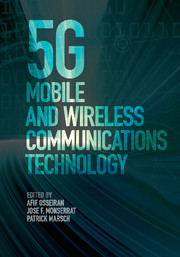Book contents
- Frontmatter
- Dedication
- Contents
- List of contributors
- Foreword
- Acknowledgments
- Acronyms
- 1 Introduction
- 2 5G use cases and system concept
- 3 The 5G architecture
- 4 Machine-type communications
- 5 Device-to-device (D2D) communications
- 6 Millimeter wave communications
- 7 The 5G radio-access technologies
- 8 Massive multiple-input multiple-output (MIMO) systems
- 9 Coordinated multi-point transmission in 5G
- 10 Relaying and wireless network coding
- 11 Interference management, mobility management, and dynamic reconfiguration
- 12 Spectrum
- 13 The 5G wireless propagation channel models
- 14 Simulation methodology
- Index
Foreword
Published online by Cambridge University Press: 05 June 2016
- Frontmatter
- Dedication
- Contents
- List of contributors
- Foreword
- Acknowledgments
- Acronyms
- 1 Introduction
- 2 5G use cases and system concept
- 3 The 5G architecture
- 4 Machine-type communications
- 5 Device-to-device (D2D) communications
- 6 Millimeter wave communications
- 7 The 5G radio-access technologies
- 8 Massive multiple-input multiple-output (MIMO) systems
- 9 Coordinated multi-point transmission in 5G
- 10 Relaying and wireless network coding
- 11 Interference management, mobility management, and dynamic reconfiguration
- 12 Spectrum
- 13 The 5G wireless propagation channel models
- 14 Simulation methodology
- Index
Summary
The ICT industry has settled into the fourth round of the game, where everyone is guaranteed to win; the successes of 2G and 3G in the past and the promise of 4G in the current decade are leading to consensus on the new fifth generation (5G) of mobile systems. These successes started off as a movement of telephony to the mobile environment, and have, by 2015, already brought the Internet into the end user's hand. This new generation of mobile systems feels different. The global scale of enthusiasm and motivation is unprecedented. Even marketing has not been shy in proclaiming the advent of 5G on the roadmap, quite in contrast to the resistance in applying the name “4G” to LTE until Release 10 of the 3GPP standards.
We are still painting the empty canvas of that system which will appear as a small icon one day on our smartphones (or equivalent) as “5G”. Can history help us predict what this system will all be about? Indeed, 2G was about global voice; 3G was about voice and data; 4G was about voice, data and applications. What about 5G?
We have witnessed mobile systems becoming an essential social infrastructure, mobilizing our daily life and facilitating digital economy. This trend will expand for 5G, boosting user experience and empowering industries with ICT, and the Internet of Things (IoT) will emerge as a new paradigm.
Credible details on the technology roadmap have started to emerge, which are largely articulated in this excellent book. 5G – so it seems – will require scale mainly in three dimensions.
First, rather traditionally, we need a massive scale in rate beyond the 4G capabilities of LTE Release 10. Spectrum is scarce in traditional cellular bands below 6 GHz, and improvement of spectrum efficiency is increasingly challenging. The only ways out seem to be through fresh approaches in system design, such as massive MIMO, mm-wave communications, relaying, network coding, advanced techniques in interference and mobility management, among others. Early prototypes and studies indicate that much of that is indeed feasible!
The world is starting to consume media such as video programming in more interactive ways, and the prospect for more immersive experiences in the form of Virtual Reality (VR) and Augmented Reality (AR) shows great challenge and promise.
- Type
- Chapter
- Information
- 5G Mobile and Wireless Communications Technology , pp. xvii - xviiiPublisher: Cambridge University PressPrint publication year: 2016



